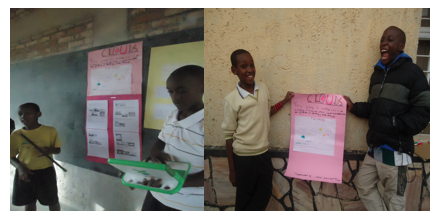On  October 27th, 2012,   the Permanent Secretary at the Ministry of Education, Mme Sharon HABA, told the press that Rwanda is highly committed to providing each child in Rwanda with an XO laptop. The Ministry of Education recently set a goal to deliver one million (1,000,000) XO laptops to children in primary schools before 2017.
Public schools in Rwanda will be given priority in the distribution process. All students in grades P4 to P6 will be given a laptop at no cost to the child and his or her parents. Given that public schools will be given priority in the distribution process, several private schools in Rwanda decided to buy laptops directly from the government for their students.
OLPC has been providing technical support and teacher training on the process of integrating the OLPC technology into their teaching and learning environments. OLPC has also provided XO disassembly training to help repair any damaged laptop. OLPC also conducted activities with its Learning Team in the ESCAF primary school in Kigali city and in another private school, AHAZAZA, located in the southern province of Rwanda.
The OLPC Learning Team is currently conducting  a one week series of sessions working with teachers and children on different project based learning activities. These sessions also provide formal training to teachers on the basics of the Sugar Learning Environment.
In these sessions, children generated many interesting project ideas. They then used their XO laptops to research and create projects which they shared with the school. They worked in groups focusing on five topics:
1. What makes different colors in the sky? It was a rainy day and the sky had lots of clouds changing from bright to dark. A group of children observed this and decided to use their laptops to research the cause. This activity led them to identify the different types of clouds and their effect on the climate.
2. Why are there differences in skin colors?  In one of the schools, the school principal is European. This led children to ask, what makes that difference in skin color? They then researched this topic and found that there are biological and physical causes.
3. School Mapping: When the OLPC Learning Team traveled to one of the schools, it was difficult to get directions to the administration office. With this in mind, the children decided to create a map of the school as well as a guide so that people who visit the school can easily find different locations.
4. Why does the food we eat come out with a different color (excretions): The children wondered why the food they eat changes color at excretion. The group found out that the digestive system is the system that takes care of the food we eat. They went on to research the digestive process.
 5. Soil erosion: Some children were not happy about the rain destroying their playground. They decided to design a water path and suggested the construction of it to the school principal in order to save their playground.
5. Soil erosion: Some children were not happy about the rain destroying their playground. They decided to design a water path and suggested the construction of it to the school principal in order to save their playground.
All of these projects were based on a real existing situation in the lives of the children. The children enjoyed working on projects of their choice.
In addition to finding areas of interest and  conducting research on that particular area, the children learned many additional skills such as self-evaluation, leadership and using the XO laptop as a tool to implement their ideas.
With the presence of some of their teachers, children chose among themselves who would be the time keeper, judge, head of the group, and group leader.  This allowed them to truly be in charge of their projects, and the adults served only as  facilitators of this learning process.
During these sessions, children found creative ways to research and implement their ideas.
With these kind of learning sessions, children learn that the XO laptop is not only for “computer time†only but that it can serve a purpose in their daily lives.




